W18293 Diet Center: Analyzing SAP ERP System Implementation
VerifiedAdded on 2022/10/19
|9
|2744
|350
Case Study
AI Summary
This assignment analyzes the case study of the Diet Center's decision to implement a SAP ERP system. The case explores the company's challenges, including political instability, high costs, and operational inefficiencies. The analysis examines the firm's growth strategy, mission, and vision in relation to the ERP implementation, highlighting the need for an integrated system to manage customer relations, finance, and operations. The report discusses the costs and benefits of the SAP ERP system, assessing its potential impact on various activities within the firm, such as finance, human resources, and procurement. The analysis also covers the expected improvements in financial reporting, customer service, and operational efficiency. The conclusion summarizes the potential for increased profitability, improved business sustainability, and enhanced decision-making through the SAP ERP system, emphasizing the importance of this strategic decision for the Diet Center's future.
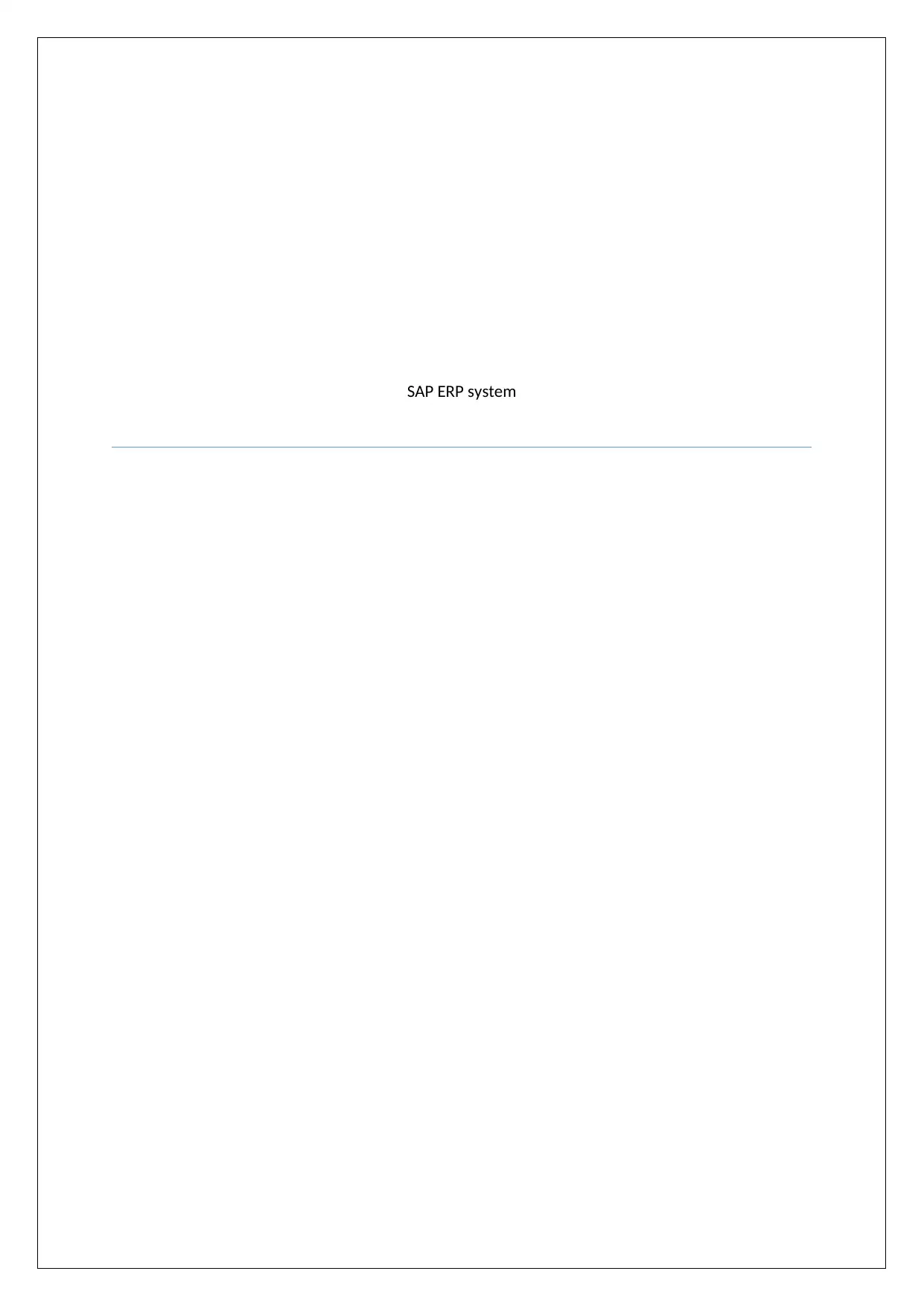
SAP ERP system
Paraphrase This Document
Need a fresh take? Get an instant paraphrase of this document with our AI Paraphraser
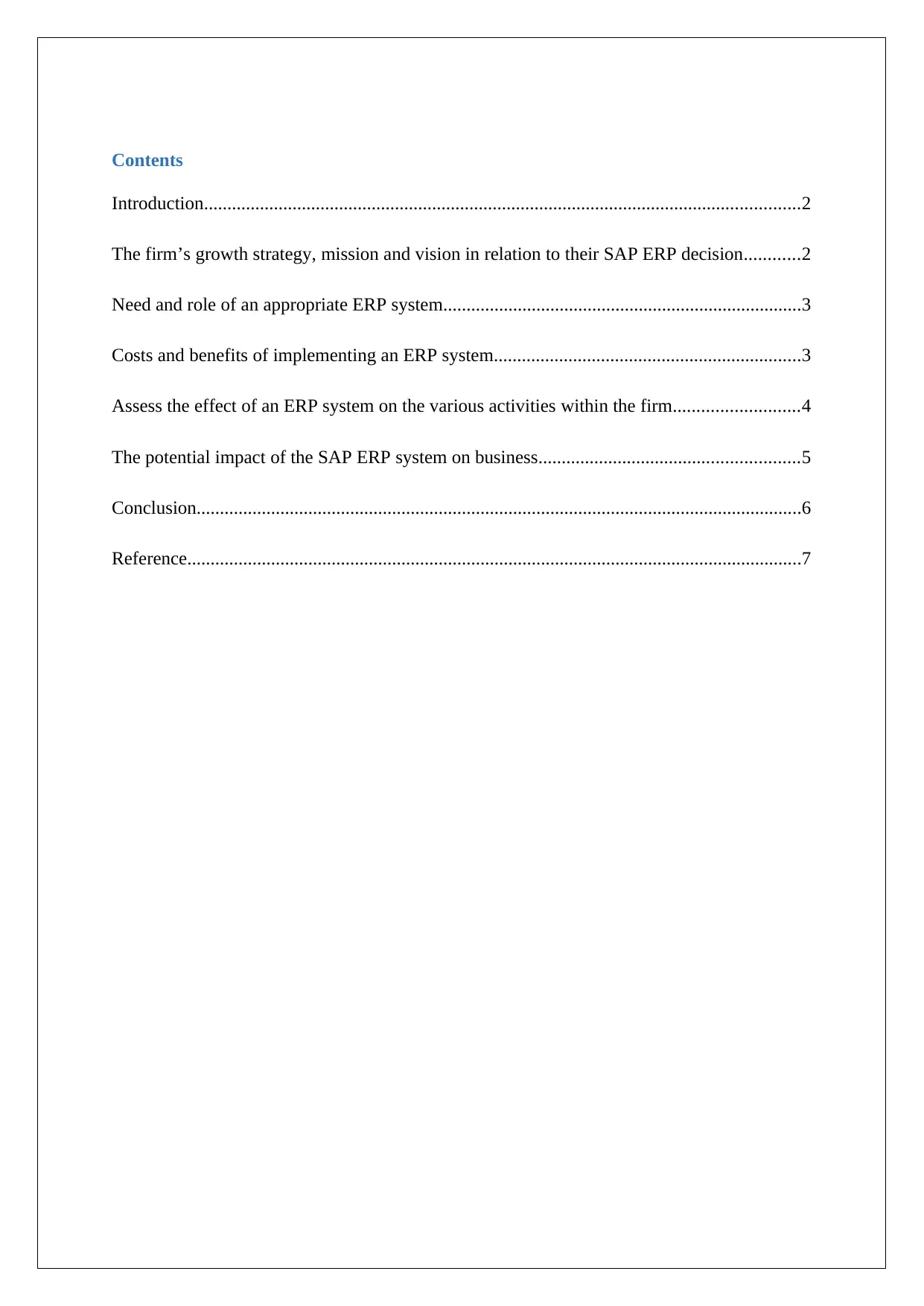
Contents
Introduction................................................................................................................................2
The firm’s growth strategy, mission and vision in relation to their SAP ERP decision............2
Need and role of an appropriate ERP system.............................................................................3
Costs and benefits of implementing an ERP system..................................................................3
Assess the effect of an ERP system on the various activities within the firm...........................4
The potential impact of the SAP ERP system on business........................................................5
Conclusion..................................................................................................................................6
Reference....................................................................................................................................7
Introduction................................................................................................................................2
The firm’s growth strategy, mission and vision in relation to their SAP ERP decision............2
Need and role of an appropriate ERP system.............................................................................3
Costs and benefits of implementing an ERP system..................................................................3
Assess the effect of an ERP system on the various activities within the firm...........................4
The potential impact of the SAP ERP system on business........................................................5
Conclusion..................................................................................................................................6
Reference....................................................................................................................................7
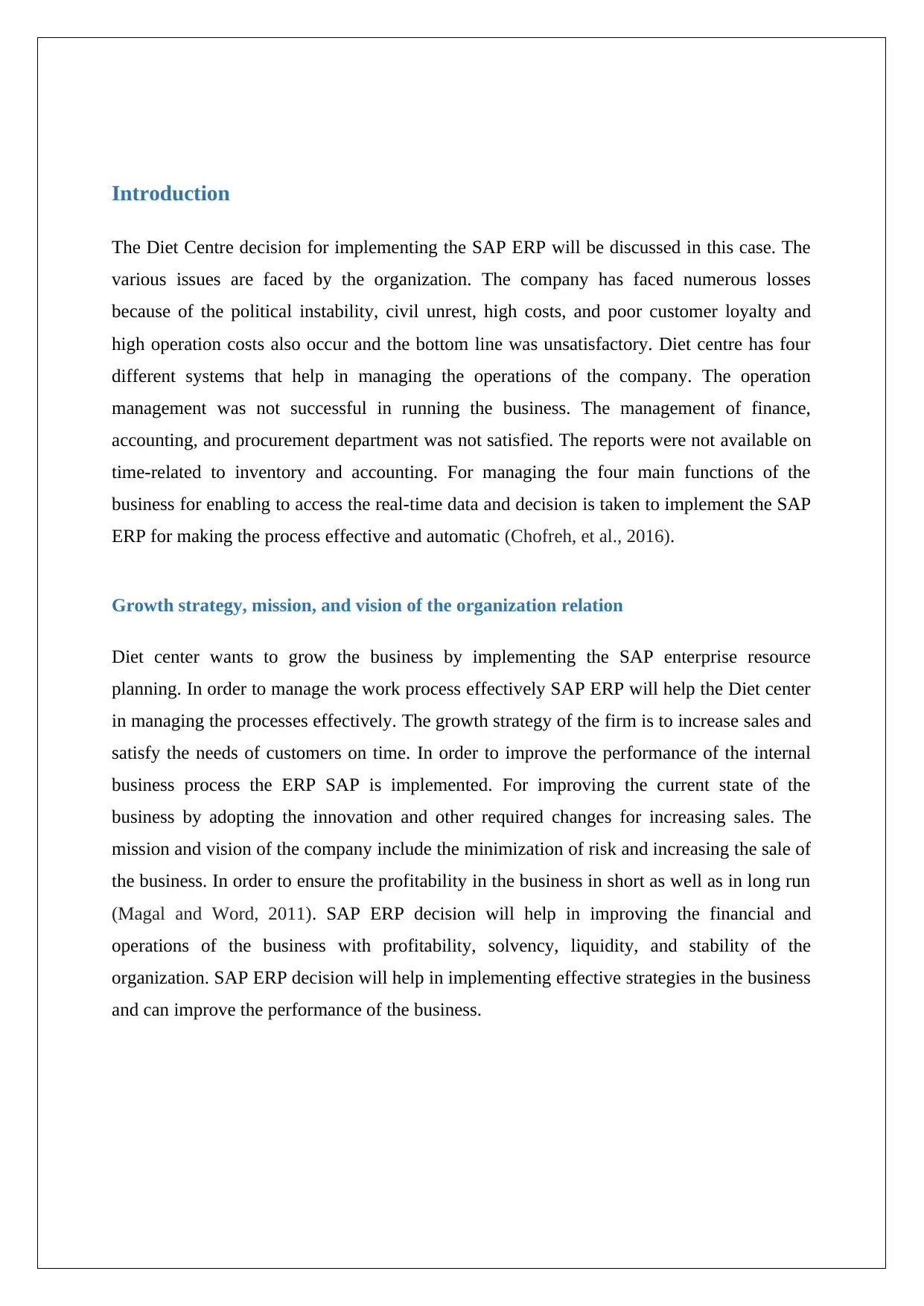
Introduction
The Diet Centre decision for implementing the SAP ERP will be discussed in this case. The
various issues are faced by the organization. The company has faced numerous losses
because of the political instability, civil unrest, high costs, and poor customer loyalty and
high operation costs also occur and the bottom line was unsatisfactory. Diet centre has four
different systems that help in managing the operations of the company. The operation
management was not successful in running the business. The management of finance,
accounting, and procurement department was not satisfied. The reports were not available on
time-related to inventory and accounting. For managing the four main functions of the
business for enabling to access the real-time data and decision is taken to implement the SAP
ERP for making the process effective and automatic (Chofreh, et al., 2016).
Growth strategy, mission, and vision of the organization relation
Diet center wants to grow the business by implementing the SAP enterprise resource
planning. In order to manage the work process effectively SAP ERP will help the Diet center
in managing the processes effectively. The growth strategy of the firm is to increase sales and
satisfy the needs of customers on time. In order to improve the performance of the internal
business process the ERP SAP is implemented. For improving the current state of the
business by adopting the innovation and other required changes for increasing sales. The
mission and vision of the company include the minimization of risk and increasing the sale of
the business. In order to ensure the profitability in the business in short as well as in long run
(Magal and Word, 2011). SAP ERP decision will help in improving the financial and
operations of the business with profitability, solvency, liquidity, and stability of the
organization. SAP ERP decision will help in implementing effective strategies in the business
and can improve the performance of the business.
The Diet Centre decision for implementing the SAP ERP will be discussed in this case. The
various issues are faced by the organization. The company has faced numerous losses
because of the political instability, civil unrest, high costs, and poor customer loyalty and
high operation costs also occur and the bottom line was unsatisfactory. Diet centre has four
different systems that help in managing the operations of the company. The operation
management was not successful in running the business. The management of finance,
accounting, and procurement department was not satisfied. The reports were not available on
time-related to inventory and accounting. For managing the four main functions of the
business for enabling to access the real-time data and decision is taken to implement the SAP
ERP for making the process effective and automatic (Chofreh, et al., 2016).
Growth strategy, mission, and vision of the organization relation
Diet center wants to grow the business by implementing the SAP enterprise resource
planning. In order to manage the work process effectively SAP ERP will help the Diet center
in managing the processes effectively. The growth strategy of the firm is to increase sales and
satisfy the needs of customers on time. In order to improve the performance of the internal
business process the ERP SAP is implemented. For improving the current state of the
business by adopting the innovation and other required changes for increasing sales. The
mission and vision of the company include the minimization of risk and increasing the sale of
the business. In order to ensure the profitability in the business in short as well as in long run
(Magal and Word, 2011). SAP ERP decision will help in improving the financial and
operations of the business with profitability, solvency, liquidity, and stability of the
organization. SAP ERP decision will help in implementing effective strategies in the business
and can improve the performance of the business.
⊘ This is a preview!⊘
Do you want full access?
Subscribe today to unlock all pages.

Trusted by 1+ million students worldwide
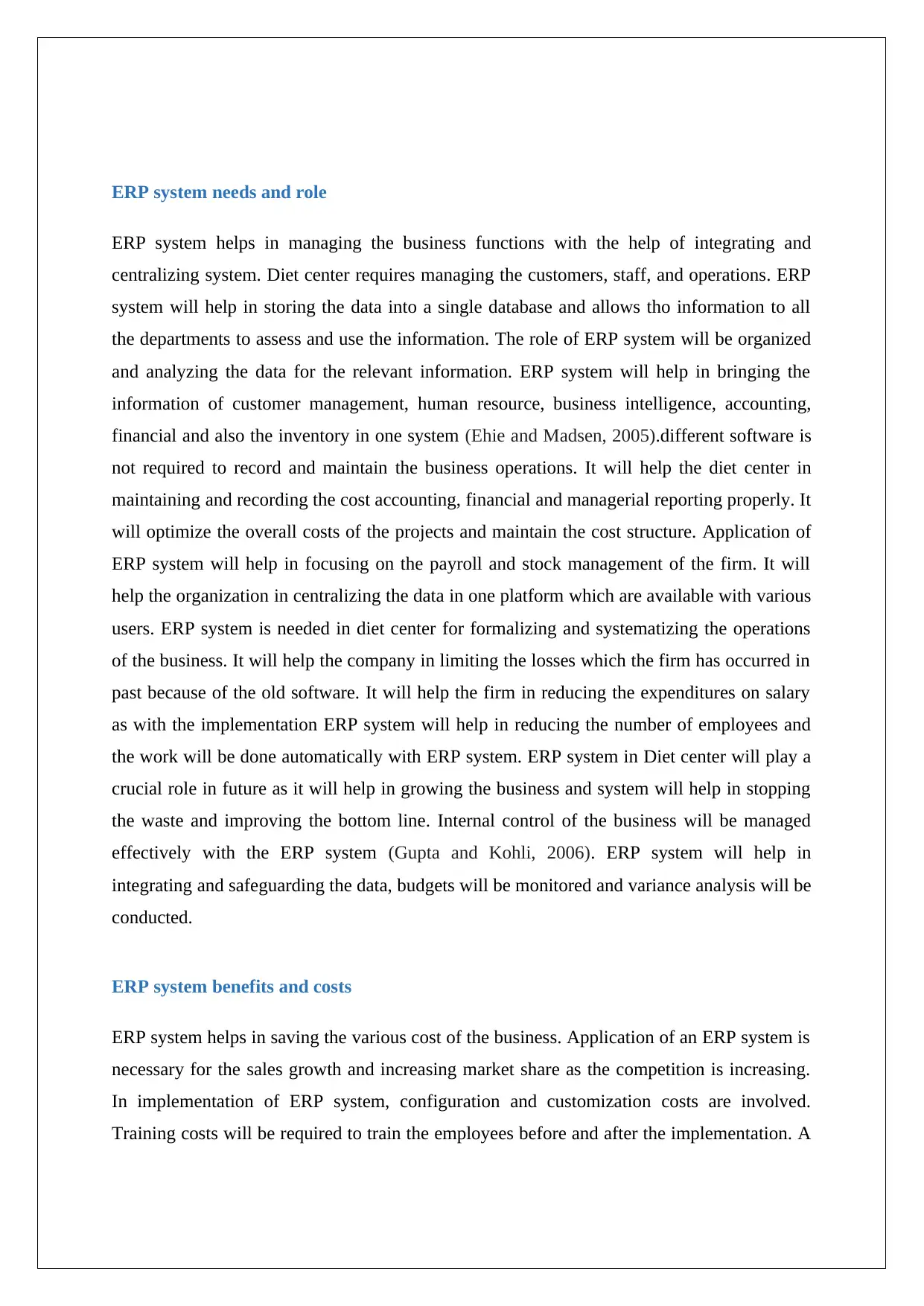
ERP system needs and role
ERP system helps in managing the business functions with the help of integrating and
centralizing system. Diet center requires managing the customers, staff, and operations. ERP
system will help in storing the data into a single database and allows tho information to all
the departments to assess and use the information. The role of ERP system will be organized
and analyzing the data for the relevant information. ERP system will help in bringing the
information of customer management, human resource, business intelligence, accounting,
financial and also the inventory in one system (Ehie and Madsen, 2005).different software is
not required to record and maintain the business operations. It will help the diet center in
maintaining and recording the cost accounting, financial and managerial reporting properly. It
will optimize the overall costs of the projects and maintain the cost structure. Application of
ERP system will help in focusing on the payroll and stock management of the firm. It will
help the organization in centralizing the data in one platform which are available with various
users. ERP system is needed in diet center for formalizing and systematizing the operations
of the business. It will help the company in limiting the losses which the firm has occurred in
past because of the old software. It will help the firm in reducing the expenditures on salary
as with the implementation ERP system will help in reducing the number of employees and
the work will be done automatically with ERP system. ERP system in Diet center will play a
crucial role in future as it will help in growing the business and system will help in stopping
the waste and improving the bottom line. Internal control of the business will be managed
effectively with the ERP system (Gupta and Kohli, 2006). ERP system will help in
integrating and safeguarding the data, budgets will be monitored and variance analysis will be
conducted.
ERP system benefits and costs
ERP system helps in saving the various cost of the business. Application of an ERP system is
necessary for the sales growth and increasing market share as the competition is increasing.
In implementation of ERP system, configuration and customization costs are involved.
Training costs will be required to train the employees before and after the implementation. A
ERP system helps in managing the business functions with the help of integrating and
centralizing system. Diet center requires managing the customers, staff, and operations. ERP
system will help in storing the data into a single database and allows tho information to all
the departments to assess and use the information. The role of ERP system will be organized
and analyzing the data for the relevant information. ERP system will help in bringing the
information of customer management, human resource, business intelligence, accounting,
financial and also the inventory in one system (Ehie and Madsen, 2005).different software is
not required to record and maintain the business operations. It will help the diet center in
maintaining and recording the cost accounting, financial and managerial reporting properly. It
will optimize the overall costs of the projects and maintain the cost structure. Application of
ERP system will help in focusing on the payroll and stock management of the firm. It will
help the organization in centralizing the data in one platform which are available with various
users. ERP system is needed in diet center for formalizing and systematizing the operations
of the business. It will help the company in limiting the losses which the firm has occurred in
past because of the old software. It will help the firm in reducing the expenditures on salary
as with the implementation ERP system will help in reducing the number of employees and
the work will be done automatically with ERP system. ERP system in Diet center will play a
crucial role in future as it will help in growing the business and system will help in stopping
the waste and improving the bottom line. Internal control of the business will be managed
effectively with the ERP system (Gupta and Kohli, 2006). ERP system will help in
integrating and safeguarding the data, budgets will be monitored and variance analysis will be
conducted.
ERP system benefits and costs
ERP system helps in saving the various cost of the business. Application of an ERP system is
necessary for the sales growth and increasing market share as the competition is increasing.
In implementation of ERP system, configuration and customization costs are involved.
Training costs will be required to train the employees before and after the implementation. A
Paraphrase This Document
Need a fresh take? Get an instant paraphrase of this document with our AI Paraphraser
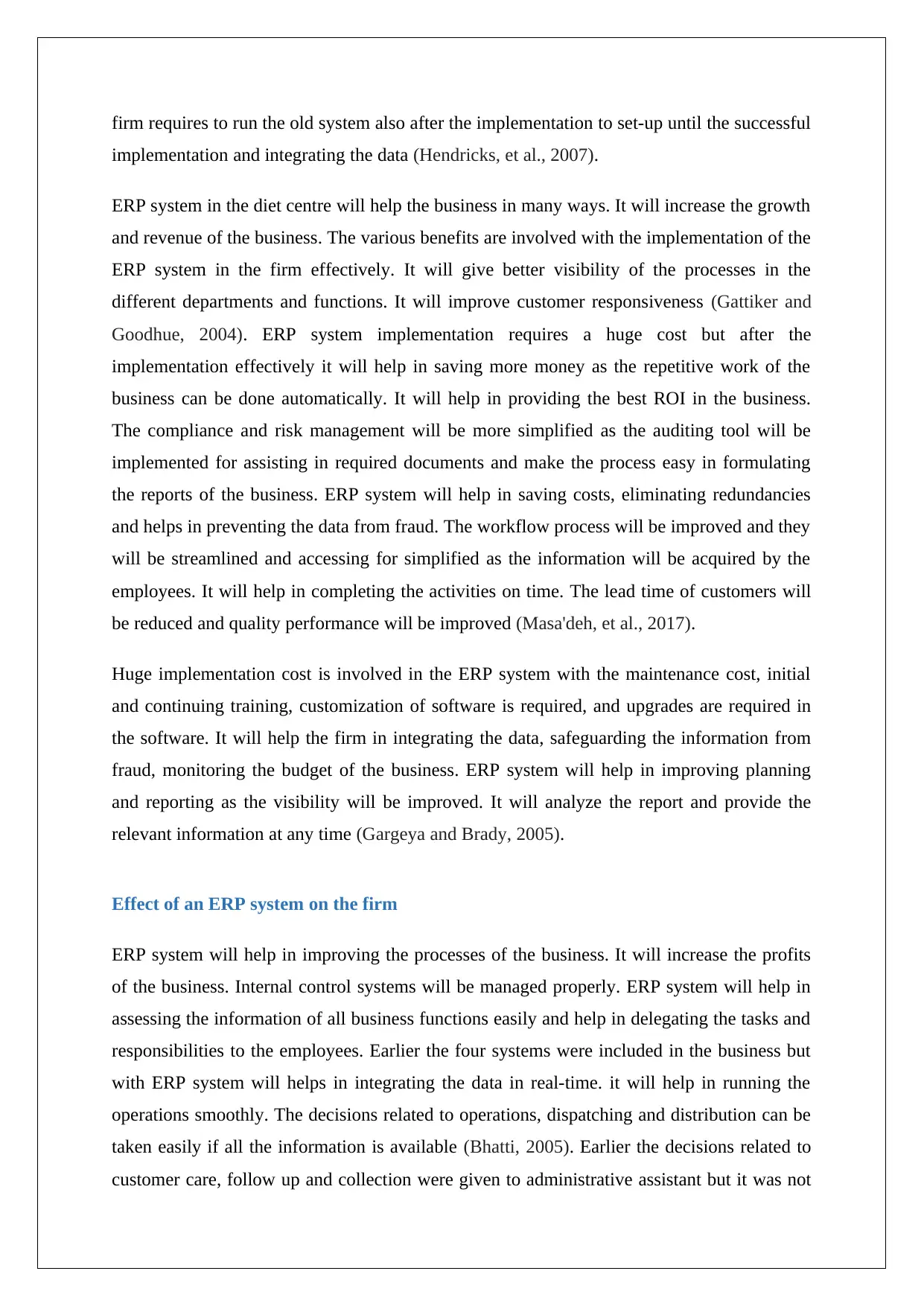
firm requires to run the old system also after the implementation to set-up until the successful
implementation and integrating the data (Hendricks, et al., 2007).
ERP system in the diet centre will help the business in many ways. It will increase the growth
and revenue of the business. The various benefits are involved with the implementation of the
ERP system in the firm effectively. It will give better visibility of the processes in the
different departments and functions. It will improve customer responsiveness (Gattiker and
Goodhue, 2004). ERP system implementation requires a huge cost but after the
implementation effectively it will help in saving more money as the repetitive work of the
business can be done automatically. It will help in providing the best ROI in the business.
The compliance and risk management will be more simplified as the auditing tool will be
implemented for assisting in required documents and make the process easy in formulating
the reports of the business. ERP system will help in saving costs, eliminating redundancies
and helps in preventing the data from fraud. The workflow process will be improved and they
will be streamlined and accessing for simplified as the information will be acquired by the
employees. It will help in completing the activities on time. The lead time of customers will
be reduced and quality performance will be improved (Masa'deh, et al., 2017).
Huge implementation cost is involved in the ERP system with the maintenance cost, initial
and continuing training, customization of software is required, and upgrades are required in
the software. It will help the firm in integrating the data, safeguarding the information from
fraud, monitoring the budget of the business. ERP system will help in improving planning
and reporting as the visibility will be improved. It will analyze the report and provide the
relevant information at any time (Gargeya and Brady, 2005).
Effect of an ERP system on the firm
ERP system will help in improving the processes of the business. It will increase the profits
of the business. Internal control systems will be managed properly. ERP system will help in
assessing the information of all business functions easily and help in delegating the tasks and
responsibilities to the employees. Earlier the four systems were included in the business but
with ERP system will helps in integrating the data in real-time. it will help in running the
operations smoothly. The decisions related to operations, dispatching and distribution can be
taken easily if all the information is available (Bhatti, 2005). Earlier the decisions related to
customer care, follow up and collection were given to administrative assistant but it was not
implementation and integrating the data (Hendricks, et al., 2007).
ERP system in the diet centre will help the business in many ways. It will increase the growth
and revenue of the business. The various benefits are involved with the implementation of the
ERP system in the firm effectively. It will give better visibility of the processes in the
different departments and functions. It will improve customer responsiveness (Gattiker and
Goodhue, 2004). ERP system implementation requires a huge cost but after the
implementation effectively it will help in saving more money as the repetitive work of the
business can be done automatically. It will help in providing the best ROI in the business.
The compliance and risk management will be more simplified as the auditing tool will be
implemented for assisting in required documents and make the process easy in formulating
the reports of the business. ERP system will help in saving costs, eliminating redundancies
and helps in preventing the data from fraud. The workflow process will be improved and they
will be streamlined and accessing for simplified as the information will be acquired by the
employees. It will help in completing the activities on time. The lead time of customers will
be reduced and quality performance will be improved (Masa'deh, et al., 2017).
Huge implementation cost is involved in the ERP system with the maintenance cost, initial
and continuing training, customization of software is required, and upgrades are required in
the software. It will help the firm in integrating the data, safeguarding the information from
fraud, monitoring the budget of the business. ERP system will help in improving planning
and reporting as the visibility will be improved. It will analyze the report and provide the
relevant information at any time (Gargeya and Brady, 2005).
Effect of an ERP system on the firm
ERP system will help in improving the processes of the business. It will increase the profits
of the business. Internal control systems will be managed properly. ERP system will help in
assessing the information of all business functions easily and help in delegating the tasks and
responsibilities to the employees. Earlier the four systems were included in the business but
with ERP system will helps in integrating the data in real-time. it will help in running the
operations smoothly. The decisions related to operations, dispatching and distribution can be
taken easily if all the information is available (Bhatti, 2005). Earlier the decisions related to
customer care, follow up and collection were given to administrative assistant but it was not
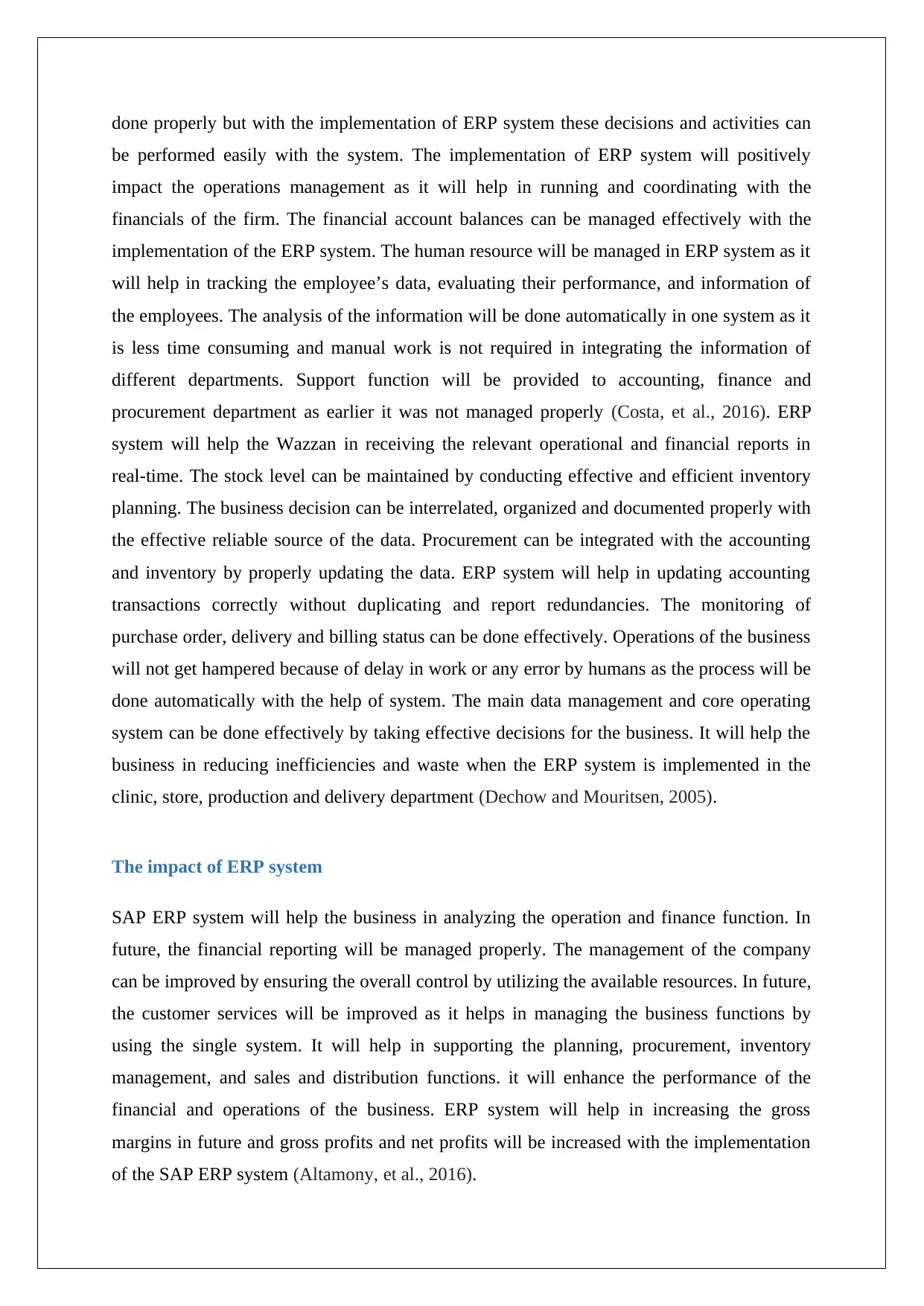
done properly but with the implementation of ERP system these decisions and activities can
be performed easily with the system. The implementation of ERP system will positively
impact the operations management as it will help in running and coordinating with the
financials of the firm. The financial account balances can be managed effectively with the
implementation of the ERP system. The human resource will be managed in ERP system as it
will help in tracking the employee’s data, evaluating their performance, and information of
the employees. The analysis of the information will be done automatically in one system as it
is less time consuming and manual work is not required in integrating the information of
different departments. Support function will be provided to accounting, finance and
procurement department as earlier it was not managed properly (Costa, et al., 2016). ERP
system will help the Wazzan in receiving the relevant operational and financial reports in
real-time. The stock level can be maintained by conducting effective and efficient inventory
planning. The business decision can be interrelated, organized and documented properly with
the effective reliable source of the data. Procurement can be integrated with the accounting
and inventory by properly updating the data. ERP system will help in updating accounting
transactions correctly without duplicating and report redundancies. The monitoring of
purchase order, delivery and billing status can be done effectively. Operations of the business
will not get hampered because of delay in work or any error by humans as the process will be
done automatically with the help of system. The main data management and core operating
system can be done effectively by taking effective decisions for the business. It will help the
business in reducing inefficiencies and waste when the ERP system is implemented in the
clinic, store, production and delivery department (Dechow and Mouritsen, 2005).
The impact of ERP system
SAP ERP system will help the business in analyzing the operation and finance function. In
future, the financial reporting will be managed properly. The management of the company
can be improved by ensuring the overall control by utilizing the available resources. In future,
the customer services will be improved as it helps in managing the business functions by
using the single system. It will help in supporting the planning, procurement, inventory
management, and sales and distribution functions. it will enhance the performance of the
financial and operations of the business. ERP system will help in increasing the gross
margins in future and gross profits and net profits will be increased with the implementation
of the SAP ERP system (Altamony, et al., 2016).
be performed easily with the system. The implementation of ERP system will positively
impact the operations management as it will help in running and coordinating with the
financials of the firm. The financial account balances can be managed effectively with the
implementation of the ERP system. The human resource will be managed in ERP system as it
will help in tracking the employee’s data, evaluating their performance, and information of
the employees. The analysis of the information will be done automatically in one system as it
is less time consuming and manual work is not required in integrating the information of
different departments. Support function will be provided to accounting, finance and
procurement department as earlier it was not managed properly (Costa, et al., 2016). ERP
system will help the Wazzan in receiving the relevant operational and financial reports in
real-time. The stock level can be maintained by conducting effective and efficient inventory
planning. The business decision can be interrelated, organized and documented properly with
the effective reliable source of the data. Procurement can be integrated with the accounting
and inventory by properly updating the data. ERP system will help in updating accounting
transactions correctly without duplicating and report redundancies. The monitoring of
purchase order, delivery and billing status can be done effectively. Operations of the business
will not get hampered because of delay in work or any error by humans as the process will be
done automatically with the help of system. The main data management and core operating
system can be done effectively by taking effective decisions for the business. It will help the
business in reducing inefficiencies and waste when the ERP system is implemented in the
clinic, store, production and delivery department (Dechow and Mouritsen, 2005).
The impact of ERP system
SAP ERP system will help the business in analyzing the operation and finance function. In
future, the financial reporting will be managed properly. The management of the company
can be improved by ensuring the overall control by utilizing the available resources. In future,
the customer services will be improved as it helps in managing the business functions by
using the single system. It will help in supporting the planning, procurement, inventory
management, and sales and distribution functions. it will enhance the performance of the
financial and operations of the business. ERP system will help in increasing the gross
margins in future and gross profits and net profits will be increased with the implementation
of the SAP ERP system (Altamony, et al., 2016).
⊘ This is a preview!⊘
Do you want full access?
Subscribe today to unlock all pages.

Trusted by 1+ million students worldwide
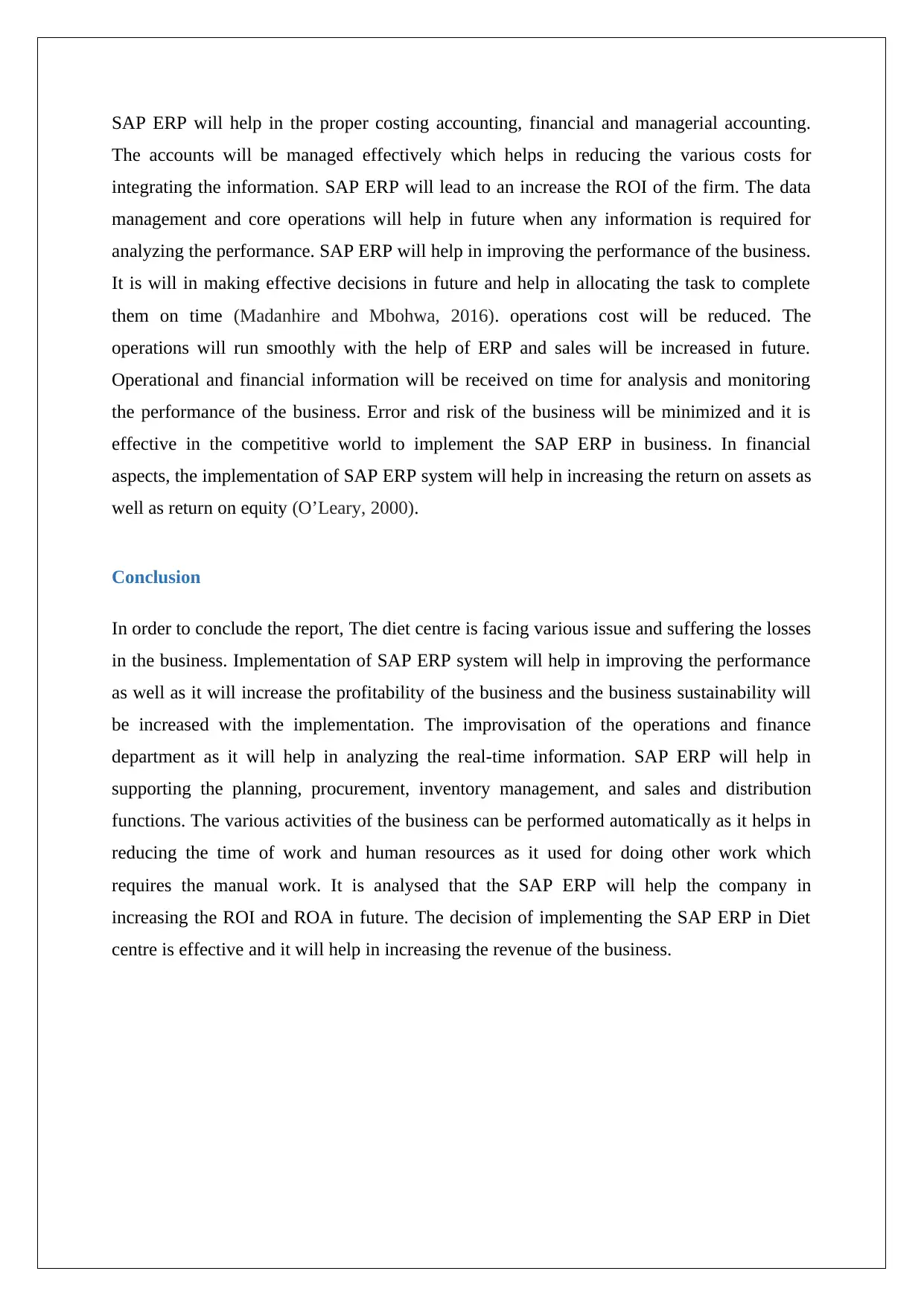
SAP ERP will help in the proper costing accounting, financial and managerial accounting.
The accounts will be managed effectively which helps in reducing the various costs for
integrating the information. SAP ERP will lead to an increase the ROI of the firm. The data
management and core operations will help in future when any information is required for
analyzing the performance. SAP ERP will help in improving the performance of the business.
It is will in making effective decisions in future and help in allocating the task to complete
them on time (Madanhire and Mbohwa, 2016). operations cost will be reduced. The
operations will run smoothly with the help of ERP and sales will be increased in future.
Operational and financial information will be received on time for analysis and monitoring
the performance of the business. Error and risk of the business will be minimized and it is
effective in the competitive world to implement the SAP ERP in business. In financial
aspects, the implementation of SAP ERP system will help in increasing the return on assets as
well as return on equity (O’Leary, 2000).
Conclusion
In order to conclude the report, The diet centre is facing various issue and suffering the losses
in the business. Implementation of SAP ERP system will help in improving the performance
as well as it will increase the profitability of the business and the business sustainability will
be increased with the implementation. The improvisation of the operations and finance
department as it will help in analyzing the real-time information. SAP ERP will help in
supporting the planning, procurement, inventory management, and sales and distribution
functions. The various activities of the business can be performed automatically as it helps in
reducing the time of work and human resources as it used for doing other work which
requires the manual work. It is analysed that the SAP ERP will help the company in
increasing the ROI and ROA in future. The decision of implementing the SAP ERP in Diet
centre is effective and it will help in increasing the revenue of the business.
The accounts will be managed effectively which helps in reducing the various costs for
integrating the information. SAP ERP will lead to an increase the ROI of the firm. The data
management and core operations will help in future when any information is required for
analyzing the performance. SAP ERP will help in improving the performance of the business.
It is will in making effective decisions in future and help in allocating the task to complete
them on time (Madanhire and Mbohwa, 2016). operations cost will be reduced. The
operations will run smoothly with the help of ERP and sales will be increased in future.
Operational and financial information will be received on time for analysis and monitoring
the performance of the business. Error and risk of the business will be minimized and it is
effective in the competitive world to implement the SAP ERP in business. In financial
aspects, the implementation of SAP ERP system will help in increasing the return on assets as
well as return on equity (O’Leary, 2000).
Conclusion
In order to conclude the report, The diet centre is facing various issue and suffering the losses
in the business. Implementation of SAP ERP system will help in improving the performance
as well as it will increase the profitability of the business and the business sustainability will
be increased with the implementation. The improvisation of the operations and finance
department as it will help in analyzing the real-time information. SAP ERP will help in
supporting the planning, procurement, inventory management, and sales and distribution
functions. The various activities of the business can be performed automatically as it helps in
reducing the time of work and human resources as it used for doing other work which
requires the manual work. It is analysed that the SAP ERP will help the company in
increasing the ROI and ROA in future. The decision of implementing the SAP ERP in Diet
centre is effective and it will help in increasing the revenue of the business.
Paraphrase This Document
Need a fresh take? Get an instant paraphrase of this document with our AI Paraphraser
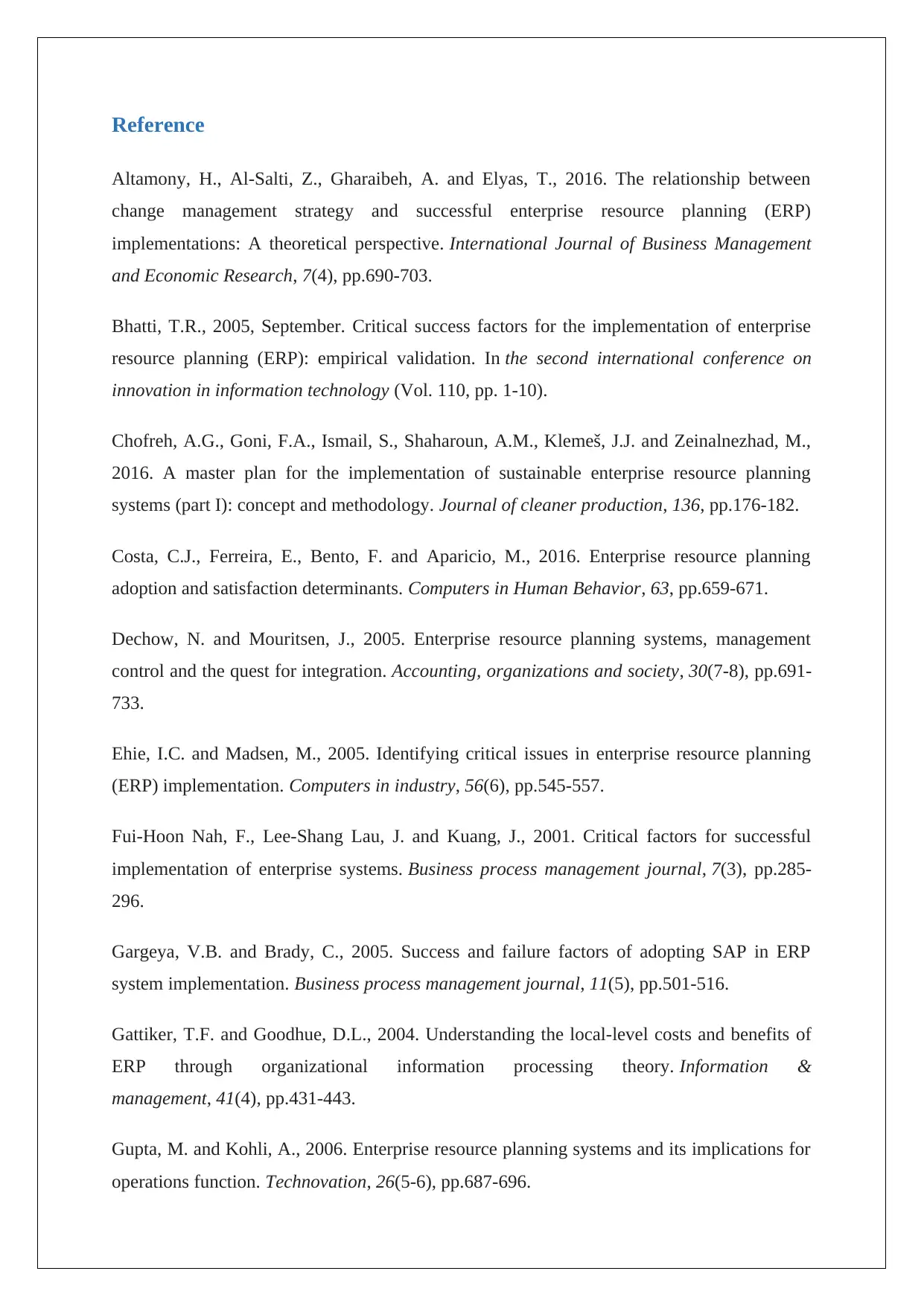
Reference
Altamony, H., Al-Salti, Z., Gharaibeh, A. and Elyas, T., 2016. The relationship between
change management strategy and successful enterprise resource planning (ERP)
implementations: A theoretical perspective. International Journal of Business Management
and Economic Research, 7(4), pp.690-703.
Bhatti, T.R., 2005, September. Critical success factors for the implementation of enterprise
resource planning (ERP): empirical validation. In the second international conference on
innovation in information technology (Vol. 110, pp. 1-10).
Chofreh, A.G., Goni, F.A., Ismail, S., Shaharoun, A.M., Klemeš, J.J. and Zeinalnezhad, M.,
2016. A master plan for the implementation of sustainable enterprise resource planning
systems (part I): concept and methodology. Journal of cleaner production, 136, pp.176-182.
Costa, C.J., Ferreira, E., Bento, F. and Aparicio, M., 2016. Enterprise resource planning
adoption and satisfaction determinants. Computers in Human Behavior, 63, pp.659-671.
Dechow, N. and Mouritsen, J., 2005. Enterprise resource planning systems, management
control and the quest for integration. Accounting, organizations and society, 30(7-8), pp.691-
733.
Ehie, I.C. and Madsen, M., 2005. Identifying critical issues in enterprise resource planning
(ERP) implementation. Computers in industry, 56(6), pp.545-557.
Fui-Hoon Nah, F., Lee-Shang Lau, J. and Kuang, J., 2001. Critical factors for successful
implementation of enterprise systems. Business process management journal, 7(3), pp.285-
296.
Gargeya, V.B. and Brady, C., 2005. Success and failure factors of adopting SAP in ERP
system implementation. Business process management journal, 11(5), pp.501-516.
Gattiker, T.F. and Goodhue, D.L., 2004. Understanding the local-level costs and benefits of
ERP through organizational information processing theory. Information &
management, 41(4), pp.431-443.
Gupta, M. and Kohli, A., 2006. Enterprise resource planning systems and its implications for
operations function. Technovation, 26(5-6), pp.687-696.
Altamony, H., Al-Salti, Z., Gharaibeh, A. and Elyas, T., 2016. The relationship between
change management strategy and successful enterprise resource planning (ERP)
implementations: A theoretical perspective. International Journal of Business Management
and Economic Research, 7(4), pp.690-703.
Bhatti, T.R., 2005, September. Critical success factors for the implementation of enterprise
resource planning (ERP): empirical validation. In the second international conference on
innovation in information technology (Vol. 110, pp. 1-10).
Chofreh, A.G., Goni, F.A., Ismail, S., Shaharoun, A.M., Klemeš, J.J. and Zeinalnezhad, M.,
2016. A master plan for the implementation of sustainable enterprise resource planning
systems (part I): concept and methodology. Journal of cleaner production, 136, pp.176-182.
Costa, C.J., Ferreira, E., Bento, F. and Aparicio, M., 2016. Enterprise resource planning
adoption and satisfaction determinants. Computers in Human Behavior, 63, pp.659-671.
Dechow, N. and Mouritsen, J., 2005. Enterprise resource planning systems, management
control and the quest for integration. Accounting, organizations and society, 30(7-8), pp.691-
733.
Ehie, I.C. and Madsen, M., 2005. Identifying critical issues in enterprise resource planning
(ERP) implementation. Computers in industry, 56(6), pp.545-557.
Fui-Hoon Nah, F., Lee-Shang Lau, J. and Kuang, J., 2001. Critical factors for successful
implementation of enterprise systems. Business process management journal, 7(3), pp.285-
296.
Gargeya, V.B. and Brady, C., 2005. Success and failure factors of adopting SAP in ERP
system implementation. Business process management journal, 11(5), pp.501-516.
Gattiker, T.F. and Goodhue, D.L., 2004. Understanding the local-level costs and benefits of
ERP through organizational information processing theory. Information &
management, 41(4), pp.431-443.
Gupta, M. and Kohli, A., 2006. Enterprise resource planning systems and its implications for
operations function. Technovation, 26(5-6), pp.687-696.
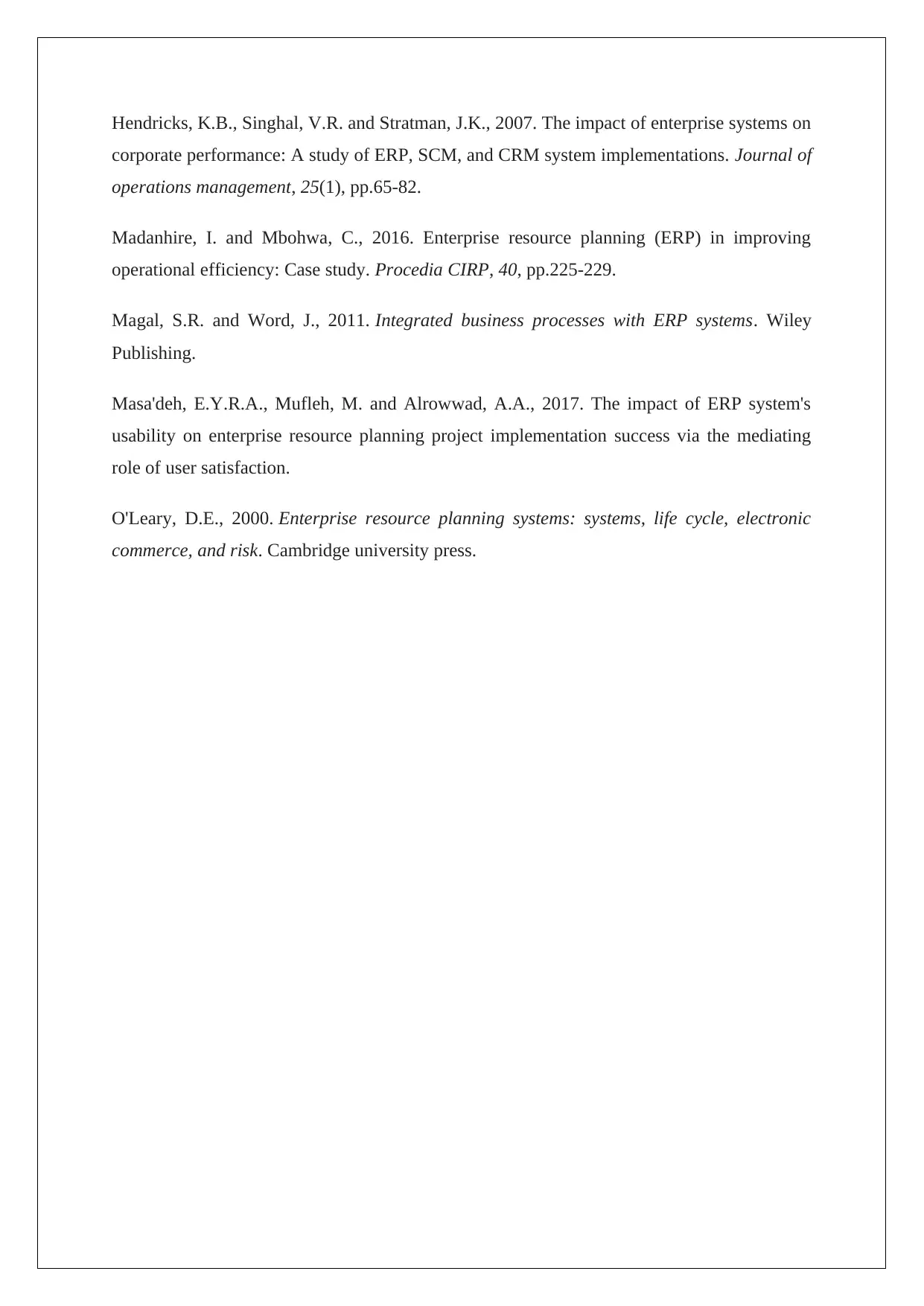
Hendricks, K.B., Singhal, V.R. and Stratman, J.K., 2007. The impact of enterprise systems on
corporate performance: A study of ERP, SCM, and CRM system implementations. Journal of
operations management, 25(1), pp.65-82.
Madanhire, I. and Mbohwa, C., 2016. Enterprise resource planning (ERP) in improving
operational efficiency: Case study. Procedia CIRP, 40, pp.225-229.
Magal, S.R. and Word, J., 2011. Integrated business processes with ERP systems. Wiley
Publishing.
Masa'deh, E.Y.R.A., Mufleh, M. and Alrowwad, A.A., 2017. The impact of ERP system's
usability on enterprise resource planning project implementation success via the mediating
role of user satisfaction.
O'Leary, D.E., 2000. Enterprise resource planning systems: systems, life cycle, electronic
commerce, and risk. Cambridge university press.
corporate performance: A study of ERP, SCM, and CRM system implementations. Journal of
operations management, 25(1), pp.65-82.
Madanhire, I. and Mbohwa, C., 2016. Enterprise resource planning (ERP) in improving
operational efficiency: Case study. Procedia CIRP, 40, pp.225-229.
Magal, S.R. and Word, J., 2011. Integrated business processes with ERP systems. Wiley
Publishing.
Masa'deh, E.Y.R.A., Mufleh, M. and Alrowwad, A.A., 2017. The impact of ERP system's
usability on enterprise resource planning project implementation success via the mediating
role of user satisfaction.
O'Leary, D.E., 2000. Enterprise resource planning systems: systems, life cycle, electronic
commerce, and risk. Cambridge university press.
⊘ This is a preview!⊘
Do you want full access?
Subscribe today to unlock all pages.

Trusted by 1+ million students worldwide
1 out of 9
Related Documents
Your All-in-One AI-Powered Toolkit for Academic Success.
+13062052269
info@desklib.com
Available 24*7 on WhatsApp / Email
![[object Object]](/_next/static/media/star-bottom.7253800d.svg)
Unlock your academic potential
Copyright © 2020–2026 A2Z Services. All Rights Reserved. Developed and managed by ZUCOL.




